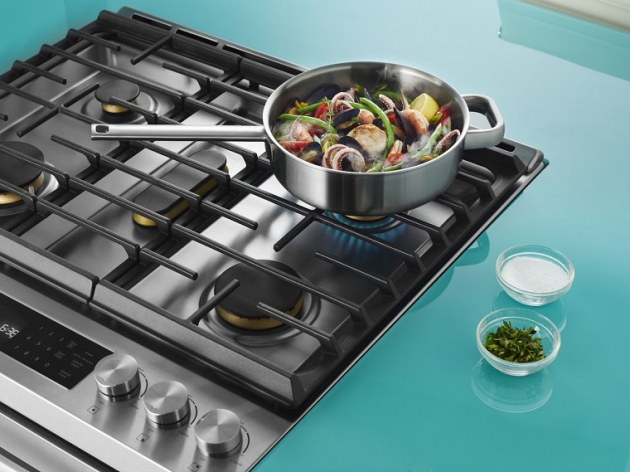Most homeowners are keen to save energy, but one way you may not have considered is saving energy in your kitchen, particularly when you’re cooking and preparing meals. Understanding your cooking habits will help you to make the best use of your energy efficient appliances to help you save on your energy bills and enjoy a greener home.
Use the Right Size Pans
When you’re cooking on your stove, it is crucial to use the right size pan or pot. Estimates suggest that a six inch pan being used on an eight inch burner can waste 40% of the heat produced by the burner. You should also keep lids on your pans or pots to trap the heat inside and allow you to use less energy. Although these may seem like small choices, it can add up to significant energy savings.
Regularly Clean Your Stovetop
Your burner efficiency can be dramatically reduced if your burner pans have been blackened from heavy use. You can avoid wasting energy by keeping your stovetop sparkling clean and shiny. Regular cleaning will prevent a build up, and you may find it more enjoyable to use.
Reduce Your Overall Cooking Time
The less time spent cooking, the less energy typically used, so try to choose energy efficient cooking methods and plan ahead to reduce your cooking time. Defrost dinner in the refrigerator overnight rather than using your microwave. Try to wait until the last few minutes to preheat your oven and try to stagger multiple pans to improve the airflow and reduce your cook time. You should also avoid opening your oven door frequently to check your food, it is not only poor general cooking practice, but it wastes a great deal of energy.
You can also reduce your cooking time and make your life easier by making additional portions. Cooking a double batch will use similar amounts of energy, but they can be used another day or frozen for later use. Frozen home-cooked meals also provide a great alternative to take out, as they are less expensive and tend to be healthier.
Upgrade Your Cookware
Research shows that a warped pan can waste 50% of stovetop heat, whereas a flat pan can use almost all the energy produced. Additionally, high-quality cookware made using highly conductive materials can allow you to use 25% less heat. An excellent choice for oven cookware is ceramic or glass, while copper bottom pans are highly efficient for stovetop cooking.
Love Your Leftovers
Leftovers need not be tired food from the day before. When you cook in bulk, you can freeze single serving portions such as pasta sauce that can be reheated in your microwave or toaster oven. While this may use more energy, the shorter cook time will make it more energy efficient. Just remember to coat your pasta in olive oil before you save it in your refrigerator to avoid needing to boil a fresh pot of water.
Choose the Right Appliances
There is a balance between choosing a microwave, toaster oven and oven. Smaller appliances can allow you to use less energy to prepare a smaller meal. If you do use your full-size oven, you can bake a cake at the same time as cooking dinner.
Depending on the dish you’re preparing, you may find a countertop appliance offers greater energy efficiency and convenience. For example, a pressure cooker or rice cooker could make it easier to prepare your food and avoid using a larger, energy-sucking appliance.
If you have concerns about the energy efficiency of your kitchen appliances and are considering upgrading, you can explore your options with this online collection or speak to a home appliance expert for a more specialized service.

